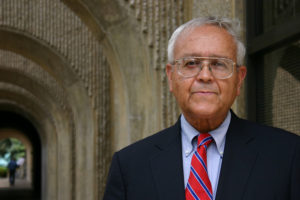Stanford Law’s William B. Gould IV Remembers Justice Ginsburg
We got to know each other when we were both visiting at Harvard in ‘71-72, and kept in touch over the years when she was on the DC Circuit and the High Court. We exchanged correspondence and reprints over the years. When I was Chairman of the National Labor Relations Board and living in Washington, Justice Ginsburg arranged for my Chief Counsel and me to sit in her special box whenever there was an oral argument before the Court involving my NLRB. On a personal level, she was kind enough to greet my grandson Joey in her chambers for a warm and cordial chat about many matters.

I am heartbroken about Justice Ginsburg’s death. She was a tower of strength intellectually, the author of powerful and persuasive opinions, frequently bringing to mind the great Holmes-Brandeis dissents a century ago and those of Douglas and Black more recently. One of many great achievements was her dissent in the Lily Ledbetter case involving wage discrimination based on gender. Though she did not prevail, quite dramatically her opinion was subsequently written into law by Congress and President Obama.
Her opinions in my field of labor and employment are for the ages (and I wrote about this in a 2014 article The Supreme Court, Job Discrimination, Affirmative Action, Globalization and Class Actions: Justice Ginsburg’s Term, 36 University of Hawai’i Law Review 371, which was based on a speech I delivered to the Labor & Employment Section of the State Bar of Hawai’i in Honolulu, Hawai’i).Her work fighting against employer devised and controlled arbitration procedures—what she aptly called “unbargained for arbitration”—will live on and may yet become law. Her dissent against the Court’s tragic and improper invalidation of the Voting Rights Act’s principal feature, in which she said that throwing out the law “when it has worked…is like throwing away your umbrella in a rainstorm because you are not getting wet,” is memorable.
The country has lost a figure of historical proportions, a lawyer who brought about change for women much as Thurgood Marshall did earlier for blacks before she ascended to the bench.
I mourn her death and send condolences to her family.
Read Stanford Law Faculty on Justice Ruth Bader Ginsburg’s Legacy
